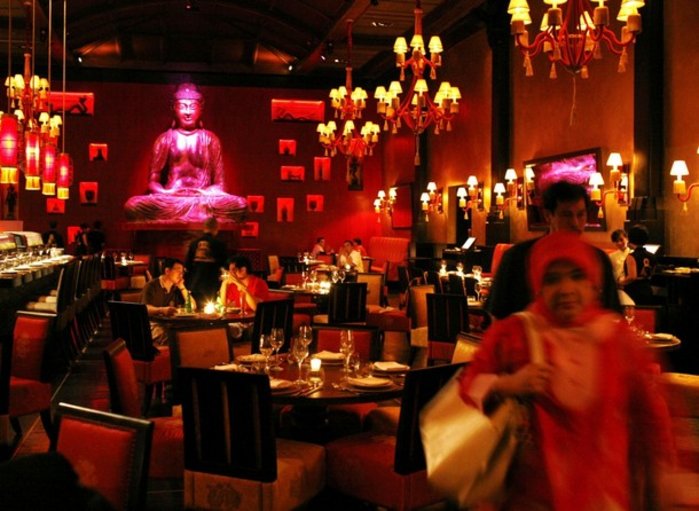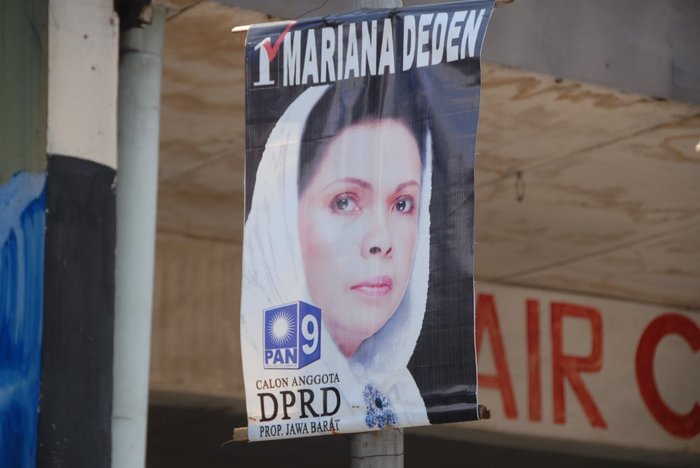Hillary’s Indonesia: In Praise of ‘Moderate Islam’
Andre Vltchek
Hillary Clinton had nothing but praise for Indonesia on her Feb 18-19 visit. She came to Indonesia as the new Secretary of State and she came, she said, as a friend. Hilary Clinton met Indonesian President Susilo Bambang Yudhoyono and later told the press that she “wanted Jakarta’s advice and counsel about how to reach out not only to the Muslim world but to Asia and beyond.”

Yudhoyono, a former Suharto general now president of Indonesia
Indonesia was an obvious stop on Clinton’s four-country tour of Asia. Less obvious were her comments, praising “the democratization process in Indonesia, which is a model for Islam,” referring to 10 years of reform since the 1998 ouster of dictator Suharto. Clinton then added this statement at a dinner with local activists, “As I travel around the world over the next years, I will be saying to people: if you want to know whether Islam, democracy, modernity and women’s rights can co-exist, go to Indonesia.”
That is, of course, music to the ears of the Indonesian political establishment, religious leaders, and the majority of Indonesians. It couldn’t be further from the truth.
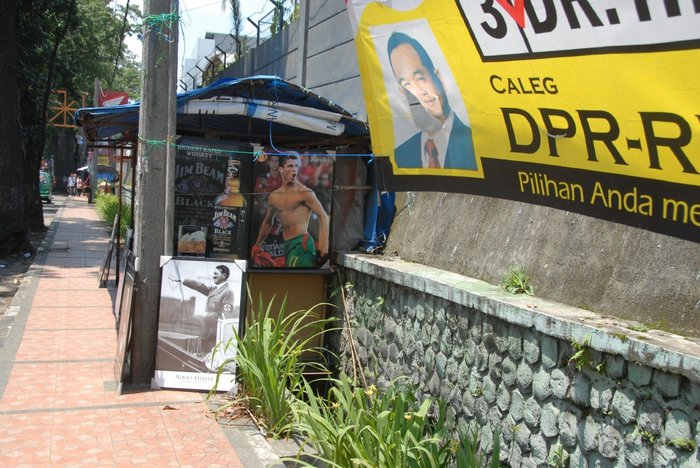
Indonesia heroes on display: Adolph Hitler (a new best seller), Jim Beam and Ronaldo
In her remarks, Clinton made no mention of genocide in oil-rich Papua. Nor did she allude to the fact that political and militant Islam is openly defying Indonesia’s constitutional guarantees of religious freedom and taking control of several parts of the country inhabited by other religious groups. She was silent, too, on the ways in which Indonesia’s business and political elite treats the impoverished, uneducated and unrepresented majority.
Religious Intolerance
In direct contrast to Clinton’s words, Indonesia and its largest religion have become increasingly intolerant. Here are a few examples:
Less than an hour’s drive from the center of Jakarta, at a jamboree site at Cibubur suburb, hundreds of girls some of them as young as 15 were (and are) still living in makeshift conditions more than 6 months after the July 25, 2008 attack against their SETIA Evangelical School of Theology in East Jakarta. During the attack more than 20 students were injured, some with machete cuts. The authorities evacuated 650 girls to the tent city in Cibubur and 600 boys to cheap “transit hotels” inside the city.
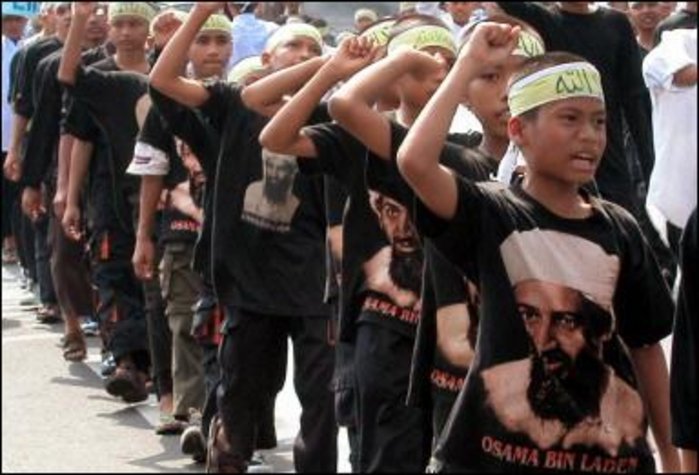
Muslim demonstrators in Setia (World Divided)
One of the victims, Ema, recalled: “They attacked the male dormitory first and later the female dormitory. They shouted from the mosque: “Jihad, Allahu Akbar, attack, kill them, burn them! The attackers used stones and firebombs and they even had guns. They were screaming: ‘Go get their people. Fight for your religion.’ And the crowd was responding: ‘Jihad! Let’s fry them – let’s make satay from them!’” remembered Entris, another victim of the attack.
The Indonesian press almost never reports anything critical of the Islamic religious mainstream. For example, the Jakarta Post reported on the attacks against SETIA in this way: “More than 1,200 Setia students were relocated off campus after a clash last July between students and residents in Kampung Pulo. The altercation began after a student was accused of stealing from a resident’s home. Students living in five dormitories and boarding houses were evacuated, as tensions escalated between the groups.” The attacks by Islamic vigilantes simply disappeared.
In June 2008, members of the radical Islamic Defenders Front (FPI) attacked secularists who were commemorating the 63rd year of Sukarno’s relatively tolerant Pancasila state ideology at the National Monument (Monas) in central Jakarta, leaving at least 70 people injured. Activists were brutally beaten and police refused to intervene. More than 1,000 officers stood by and watched the violence. FPI, wearing long white robes not unlike those of the KKK, regularly attack bars, cafes and pork-selling establishments and other “haram” establishments with the state either indirectly supporting their actions or not daring to intervene.
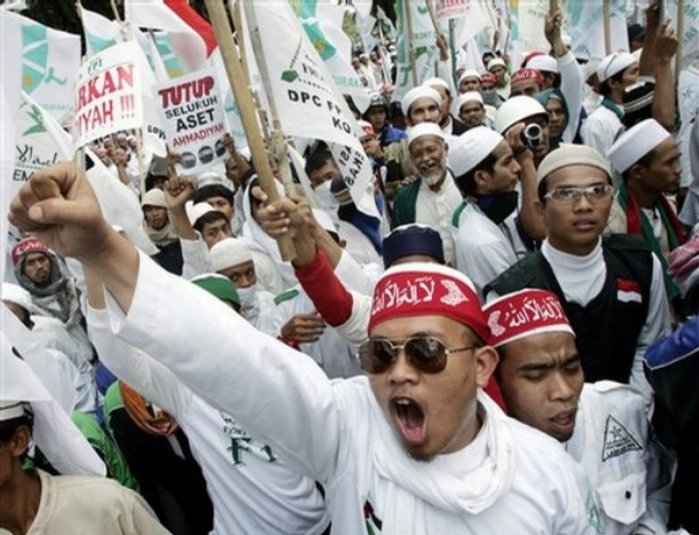
FPI rally on August 27. (Tatan Syuflana)
Both Ahmadiyah (one of Indonesia’s oldest Muslim sects, with 500,000 members and an 80 year history) and Islam Liberal suffered repeated attacks, their houses of worship burned down after the religious establishment defined them as deviant. The fundamentalist mainstream pressured the Indonesian government to ban Ahmadiyah from preaching in public.
In August 2007, more than 70,000 members of the Muslim diaspora from throughout the world descended on Jakarta, calling for a caliphate — or Islamic rule — to govern the world. The authorities allowed them to use the biggest stadium in Central Jakarta.
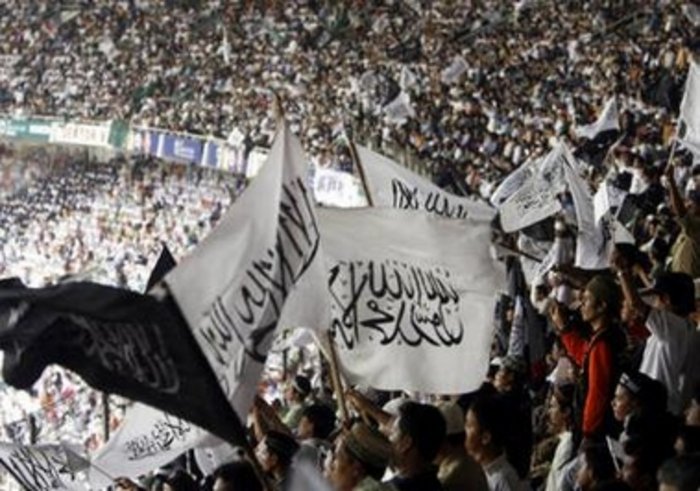
Caliphate rally at Bung Karno Stadium (press photo).
“There is nothing we can do to stop this”, said Ditasari a political leader and former head of PRD, the only progressive opposition party to emerge during the so-called reformation period that followed the 1965 military coup. “Indonesia has been hijacked by Islamists and religion is in full control over society. We can’t reverse the process. We can only slow it down to some degree. You can’t say that you don’t believe in God, anymore. For years atheists were compared to Marxists and Marxists were a legitimate target. This Presidency is the worst that could have happened to Indonesia”, commented Ditasari. The government is too weak to confront religious extremism, corruption and other major problems that Indonesia is facing. Yudhoyono is not willing to take decisive action to defend the constitution.”
The government’s recent Electronic Information and Transactions Law bans pornographic websites. It also bans the spread of “false news” and “racial and religious hate messages.” The government could well interpret this to mean any news or comment not officially approved, or any criticism of religion. In December 2008, the government ratified the anti-pornography law, criminalizing any sex-related materials deemed to violate public morality, including traditional and modern music and dances, as well as dresses worn by women in different parts of archipelago.
Finally, several parts of Indonesia, notably West Java and North Sumatra, are now controlled by Sharia-law, which imposes religious justice and dictates dress codes for women. The current administration did nothing to stop this.
While the Muslim majority is extremely protective of its symbolism, particularly anything connected to the prophet, hundreds of churches have been attacked, forcing Catholics and Protestants to pray in rented halls in shopping malls or hotels. In early March 2009, Buddhist youth demonstrated and blocked the entrance to a newly opened “Buddha Bar” associated with the Buddha Bar in Paris and New York, for violating their religious sensitivities. The bar opened in the old Dutch-built cultural center that in colonial days had exhibited works by Chagall and Picasso exhibited in colonial days and is now privatised. In this instance, the students succeeded in closing the bar, demanding that the name be changed.
Political Intolerance
Political killings and gross human rights violations take place routinely throughout the Indonesian archipelago (see here for more information). However, the international press has covered only the most extreme cases, such as the murder of human rights and anti-corruption activist Munir Said Thalib in 2004 aboard Garuda Indonesia Airlines, bound for Amsterdam via Singapore, allegedly by a Garuda pilot and an Indonesian intelligence officer.
“Since 1965, Indonesia has been a staunch U.S. ally,” says Nursyahbani Katjasungkana, a member of the House of Representatives from the progressive Islamic National Awakening Party. “And those who forged this alliance control the mass media, so the criticism of the human rights in Indonesia very rarely makes headlines here or there.”
In December 2008, for instance, police officers and hired guns for the Arara Abadi corporation attacked a peasant community in Riau province to gain control of the land, arresting 200 peasants, destroying 700 houses, and forcing 400 people into hiding in the forest.
This year, once again, Fadjroel Rachman tried to run as an independent presidential candidate. The Constitutional Court rejected his candidacy, upholding the rule that a presidential candidate must be from a party or coalition of parties that won at least 20% of the votes in the previous election. This effectively disqualifies anyone not deeply rooted in the system.
Rachman is critical of the current government’s pornography law, its support for sharia law, and its religious intolerance. “The fight for democracy and democratic Islam has deep roots in Indonesian society, but it has nothing to do with the present administration,” he says, zeroing in on a specific piece of legislation to secure women’s rights the government has failed to back. “Right now Susilo Bambang Yudhoyono is not willing to even issue a government decree introducing affirmative action for women in parliament, a plan that would set aside 30% seats in the Parliament for women. The hard work of all those who fought for this goes to waste.”
Economic Intolerance
There is hardly any place in the world where the difference between rich and poor is be more extreme than Indonesia. Jakarta is a city of luxury hotels and malls, with children playing in open sewers nearby. By the international poverty standard of $2 dollars a day, more than half the population of Indonesia is poor.
“I just came back from Riau,” says Indonesian human rights lawyer Todung Mulya Lubis. “It is a very wealthy province with 8% annual economic growth and trillions of Rupiah in their annual budget. But they said that there are at least 1 million people that do not have electricity there.”
In 2006, a mining accident left more than 50,000 people homeless in Porong. Lapindo Brantas, the company responsible, is owned by the family of welfare minister Aburizal Bakrie. Last year, Forbes listed Bakrie as Indonesia’s richest man with a total fortune of about $9 billion. Bakrie not only retained his job but refused, until very recently, to pay even the most modest compensation to the victims. “The victims not only lost land, schools, houses, and other buildings,” says Lubis. “They lost a collective identity – the place they belonged to for a very long time.
Ethnic Intolerance
Indonesia has occupied West Papua in much the same way that it occupied East Timor.
“An estimated 100,000 Papuans, or 10% of the population, have been killed by the Indonesian military. This is a fraction of the true figure, according to refugees,” writes John Pilger. He quotes a refugee who made it to Australia after a harrowing trip by canoe: “They treat West Papuans like animals. They kill us like animals. They have created militias and jihadis to do just that. It is the same as East Timor.”
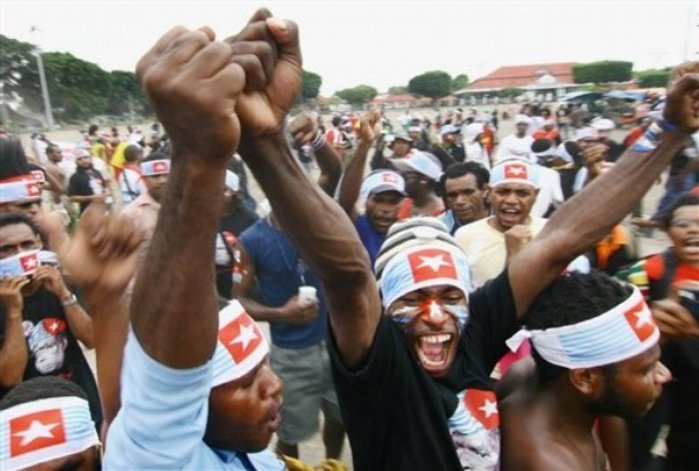
West Papua rally, July 19, 2008. (Press photo)
The United States, like other countries with economic interests in West Papua, has looked the other way at Indonesia’s conduct there. These oil and mining interests supply the Indonesian government and US companies billions of dollars annually. Meanwhile, economic conditions in West Papua are appalling, with health indicators considerably below the Indonesian average.
A new non-violent movement is taking shape in West Papua, largely replacing an armed struggle that failed to achieve its objectives or international support.
US Policy
The United States and Australia helped to plan the 1965 coup that sidelined progressive leader Sukarno and brought in the military clique of General Suharto. An estimated two million people died – Communists, union leaders, teachers, artists, and members of the Chinese minority. The US also supported Indonesia’s invasion of East Timor in December 1975, which resulted in one-third of the population either killed or starved to death.
East Timor gained independence, but genocide in Papua still continues, and so does forced Islamization of the population there, inconvenient facts unmentioned by those who would promote Indonesia as an example of Islamic tolerance.
Indonesia has long been important for the United States, as a bulwark of anti-Communism, as a source of abundant raw materials, above all oil, and in recent years its potential as a moderating influence on the Islamic world has loomed large . As Nursyahbani Katjasungkana, a member of the Indonesian parliament and human rights lawyer observes,
“When Clinton came here and spoke about tolerant Islam and human rights, she decided not to mention many incidents including those that occurred at MONAS as well as that involving the Ahmadiyah Muslim sect. Since 1965, Indonesia has been a staunch US ally. And those who forged such an alliance control the mass media, so criticism of human rights in Indonesia very rarely makes headlines here or there. Also, Indonesia has the largest Muslim population in the world. US leaders think that Indonesia can control or at least influence Muslims all over the world – under US leadership, of course!”
As a child, Barack Obama lived in Indonesia for several years. He was known as “Barry from Menteng,” after the neighborhood where he lived. His stepfather, returning from Hawaii in 1967 shortly after the military coup, was an Indonesian army officer before becoming a consultant to Mobil Oil. In “Dreams of My Father” Obama recalls being troubled by the poverty around him, “the empty look on the faces of farmers the year the rains never came” and, “the desperation of the disabled beggars who came to the family’s door.” He grew up not in a kampung (village), however, but in a posh Jakarta neighborhood.
To break with the shameful past role the United States played in Indonesia, Obama and his Secretary of State need to tell the truth, not shower the establishment with sweet bouquets of clichés. That truth begins the US-supported 1965 coup and mass slaughter, it continues with US support for Indonesia’s invasion of East Timor, the repression of Papua and the role that the United States and big business interests played over the decades in which the US propped up the corrupt Suharto regime. This is his obligation, both as a kid called “Barry from Menteng” and as President of the United States.
ANDRE VLTCHEK – novelist, journalist and filmmaker, author of several novels including Point of No Return and director of a documentary film about Suharto’s dictatorship: “Terlena – Breaking of a Nation”.. He is presently living in Southeast Asia and East Africa and can be reached at: [email protected]
He wrote this article and provided many of the photographs (except those otherwise identified) for The Asia-Pacific Journal. Posted on March 29, 2009.
Recommended citation: Andre Vltchek, “Hillary’s Indonesia: In Praise of ‘Moderate Islam’” The Asia-Pacific Journal, Vol. 13-2-09, March 29, 2009.



